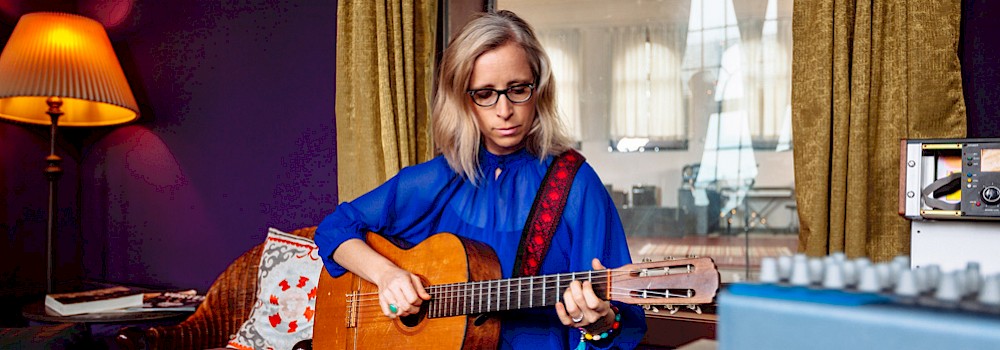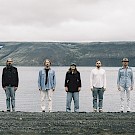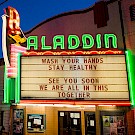 Laura Veirs didn’t set out to write a concept album, but the themes on her 10th solo release came into focus over the course of a year’s worth of writing. Working on The Lookout was an exercise in daily diligence, showing up—office style—four days a week, four hours a day, and challenging herself in her songwriting.
Laura Veirs didn’t set out to write a concept album, but the themes on her 10th solo release came into focus over the course of a year’s worth of writing. Working on The Lookout was an exercise in daily diligence, showing up—office style—four days a week, four hours a day, and challenging herself in her songwriting.
“One of the things an artist wants to do this far in is surprise herself. So, I made these little cards that were prompts,” Veirs explains. “Twenty prompts in 20 cards for 20 days.”
“Use words from a poem to start your song” was one such prompt. The opening track, “Margaret Sands,” pulls a line from one of the most influential poems of the 20th century: T. S. Eliot’s “The Waste Land.” From the section “Death by Water,” Veirs chose “you who turn the wheel” to write about a sailor in a crow’s nest—a literal first lookout point on the record, surveying the land for what’s coming, grateful to be alive, and realizing the fleeting beauty of life as his boat glides above a woman’s skeleton, picked clean by deep-sea creatures.
“I’ve repeated myself a lot in terms of lyrics and chords, so I was trying to find new words,” Veirs tells. “Turquoise was new. Brain. Thigh. I put a koi fish in. Things that seem small, but feel big, because they were new—they are subtle. I don't want to feel bored and stuck as a writer. I want to feel like I'm trying new things.”
Veirs also drew sonic inspiration and poetic devices from other heavy-hitter folk and country singers as well as contemporary electronic pop performers, citing a playlist of influences that includes Neil Young, Glen Campbell, Juana Molina, Laura Marling, Annalisa Tornfelt, Sylvan Esso, Wilco, José González, and Fleet Foxes. She borrowed the description of the night sky as a “dome” from Joni Mitchell’s “Carey” off of Blue, regarded as one of the greatest albums of all time and one Veirs has often revisited. She noticed Dylan switching perspectives and pronouns in his songs, and tried that out on “The Canyon.”
Still, some beautiful and familiar things consistently appear in Veirs’ music, like the language of science and a view of the world through the eyes of nature. This has a lot to do with her parents. “I’m the combination of them—I can't help it—I just have them in me.” Her father taught college physics and astronomy, and her mother, a crafter and artist-type, taught elementary school for a gifted and talented program. Being educators meant summers off to take outdoor family trips camping in nearby national forests and parks and hiking the high mountains of Colorado Springs where she grew up.
This background would lead her to study geology and make use of geologic terms in her songwriting. “I try not to be heavy-handed with it, I don't like to overdo it, but I found it to be a fertile place for me in terms of writing and having metaphors and images that come quickly and easily.” In keeping with Veirs’ pleasing preoccupation of writing about stars, cosmological lyrics shine through with references to Polaris and Sirius, the “white dog circling overhead.” Even the song “Heavy Petals” references our recently lost Starman, David Bowie.
The Lookout is an electrified ecosystem of songs set under sapphire skies, in desert canyons and moonlit meadows, on sunlit oceans and over starlit landscapes, flush with color in burgeoning green, gold and red, and filled with the sounds of campfire, wolf howls and painted winds. Veirs’ harmonic vocals resonate like calls through a canyon while longtime friend and collaborator Sufjan Stevens provides guest vocals on “Watch Fire,” echoing the theme of messengers and protectors in a delicate call-and-response duet. Strings, acoustic steel and electric guitars swell while synth sounds shimmer as light on the surface of water, and punctuated piano measures twinkle here and there like constellations.
“I’ve always had a fascination with science and the similarities between the artistic process and the scientific discovery—they're both very intuitive. When you think about the beauty of the natural world, looking at something like a diatom under the microscope—it's so beautiful and symmetrical, it's almost like a piece of art."
Finely wrought details reveal themselves throughout the songs on The Lookout in equal parts science and art. There are so many sweetly situated textures perfectly humming in and out of focus, blurring the lines between natural instrumentation and synthetic soundscapes. You hear it harnessed on “Lightning Rod” where the subdued resonating buzz of a Tesla coil is set to a staccatoed waltz. Other production and engineering feats are perfectly realized on songs like “When It Grows Darkest,” where a sitar dissolves into trembling woodwinds until replaced by the mimicking whir of cricketsong or cicada drone, then shatters into a slinking drumbeat and wheeling acoustic arpeggios.
Veirs sings of “devotional experiments,” describing Ben Franklin risking certain death with his key and kite on a high hill, channeling electricity and “drawing fire from the clouds.” Here again, a restatement of one of the record’s central themes: “Artists, scientists and activists are natural ‘lookouts;’ they are a conduit for a greater purpose or bigger ideas. If I feel sad and hopeless I find inspiration to persevere through literature, music and art.”
Working on The Lookout required a certain perseverance but also spawned two new outlets. The isolation of growing a project and the exhaustion of completion was not unlike giving birth—motherhood being, in Veirs’ opinion, “the most profound and ultimate creative experience.” In the doldrums of wrapping up the album, she sought to expand her community and connect with other “mother musicians,” and thus, her podcast Midnight Lightning was born.
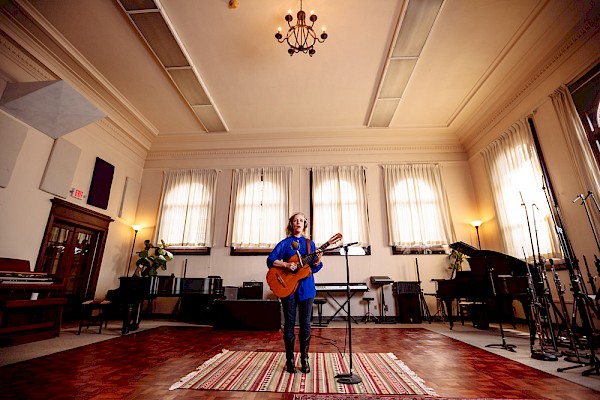 Laura Veirs at The Hallowed Halls“I just felt so burnt out on writing. I started to feel isolated in my predicament. I have had times where I've been like, ‘Well, what am I supposed to do? Am I supposed to go out on the road? How much? What do I do with the kids?’ It's a lot of conflict and confusion about the best choices to make when you’re a touring musician, as a parent, and especially as a mom. I wanted to find more people to talk to so I would feel less isolated and lonely. A podcast seemed like the perfect platform.”
Laura Veirs at The Hallowed Halls“I just felt so burnt out on writing. I started to feel isolated in my predicament. I have had times where I've been like, ‘Well, what am I supposed to do? Am I supposed to go out on the road? How much? What do I do with the kids?’ It's a lot of conflict and confusion about the best choices to make when you’re a touring musician, as a parent, and especially as a mom. I wanted to find more people to talk to so I would feel less isolated and lonely. A podcast seemed like the perfect platform.”
Midnight Lightning’s first season features interviews with an impressive list of 14 women musicians, both local (Sleater-Kinney’s Corin Tucker, Pink Martini's China Forbes, LaRhonda Steele) and national (Rosanne Cash, Meshell Ndegeocello, Rhiannon Giddens), from diverse backgrounds, genres and parenting experiences exploring the challenges and rewards of juggling family life with a career in music. A second season is in the works to interview musician dads.
“They're almost pitted against each other: your career as a musician and your life as a parent. But there are ways that they feed each other and are good.”
One of those good ways is the appearance of Veirs’ children, Tennessee and Oz, on the album shouting potent interjections on “Lightning Rod.” The other is the release of Veirs’ first children’s picture book in January, titled Libba: The Magnificent Musical Life of Elizabeth Cotten, with illustrations from New York-based artist-activist Tatyana Fazlalizadeh. Libba is about one of the most celebrated, self-taught American blues and folk musicians, best known for her song “Freight Train.” Cotten put her music career on hold for children and church, but experienced later-in-life success, touring and performing right up to the end of her life at age 94. Her unique picking patterns have become standard techniques in folk guitar. Dylan covered the popular "Shake Sugaree" and the Grateful Dead her “Oh Babe, It Ain't No Lie.”
As synchronicities go, a rare Grateful Dead song, “Mountains of the Moon,” appears on the album with Jim James (of My Morning Jacket) providing backing harmonies. It was a song her husband (and longtime producer) Tucker Martine asked Veirs to learn as a Father’s Day present. Grateful Dead had been her first concert and she explains, “Tucker and I were both big Grateful Dead fans in high school. Recently, we realized that we were both at the same Dead show at Red Rocks in 1987 although it took another 13 years for us to meet in Seattle.” The song fit perfectly with the album as “the ultimate lookout is on the moon because you can see the whole Earth and have this wider perspective.”
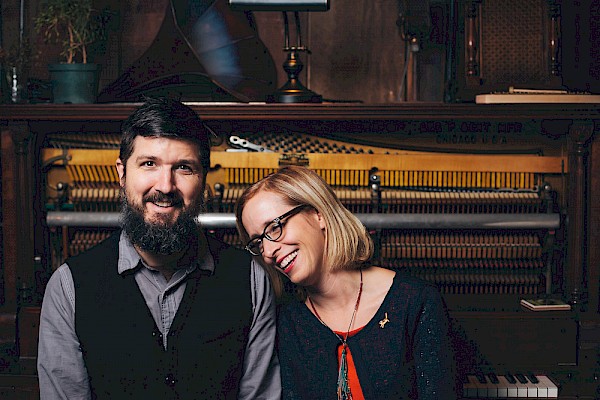 Tucker Martine and Laura Veirs at Flora Recording & PlaybackThe title track on The Lookout is ultimately a love song to Martine. “I get to have this connection with him that I don't have with anyone else in the world. I trust him so much and I feel so lucky to have him as my 'lookout on the ground.' In this political climate and in certain complicated friendships, I can’t always read other people, which makes having someone in my life who is always straight with me that much more important."
Tucker Martine and Laura Veirs at Flora Recording & PlaybackThe title track on The Lookout is ultimately a love song to Martine. “I get to have this connection with him that I don't have with anyone else in the world. I trust him so much and I feel so lucky to have him as my 'lookout on the ground.' In this political climate and in certain complicated friendships, I can’t always read other people, which makes having someone in my life who is always straight with me that much more important."
Going into their 10th record together, Veirs and Martine had to wonder, "'How are you going to do something that’s better than what you’ve done?' Or that’s not just another version of what you’ve done?" Martine asks. "Those are really valuable questions to be able to answer with a collaborator."
"Some of my favorite records that I’ve ever worked on are her records," Martine tells. "And there’s just something about that collaboration that brings out the best in me, and they’re some of the most satisfying records. What she brings is great, fully written songs but they leave a lot of room for the imagination, for arrangements to sort of fill in the gaps. And she gives me all the room in the world to do that and they just take my ideas well."
 See Laura Veirs live and celebrate the release of 'The Lookout' at Mississippi Studios on May 19In simultaneously releasing an album, a children’s book, and a podcast for working musician mothers like herself, Veirs is tending to her "devotional experiments" and asserting her “tenderest rage.”
See Laura Veirs live and celebrate the release of 'The Lookout' at Mississippi Studios on May 19In simultaneously releasing an album, a children’s book, and a podcast for working musician mothers like herself, Veirs is tending to her "devotional experiments" and asserting her “tenderest rage.”
“One of the lyrics in ‘Mountains of the Moon’ says, ‘It’s time to matter.’ Do not, in this confusing time, be susceptible to nihilistic thinking or cynicism. Yes, it is fucked right now, but you do matter and if you give up on thinking that you matter, then we're all lost—so use your voice to be a lookout for others, to look out for others, to look out for yourself. Use your strength and power however you can to work for good because we need each other more than ever right now.”

